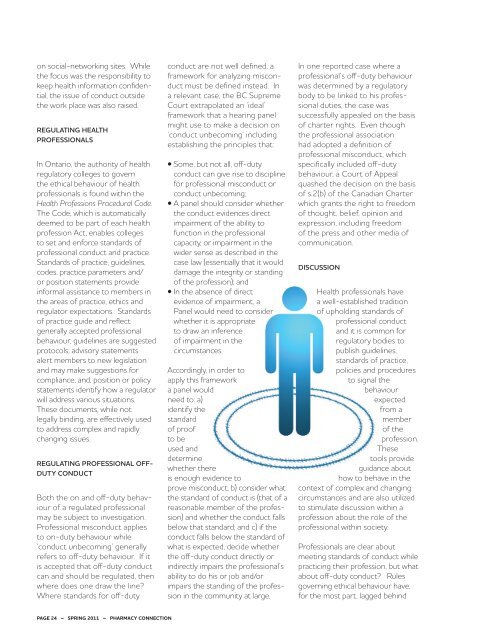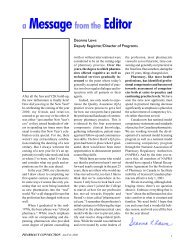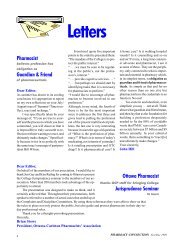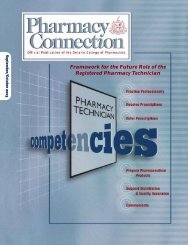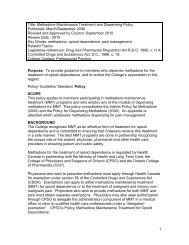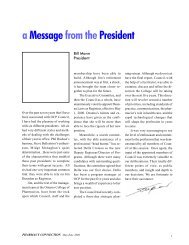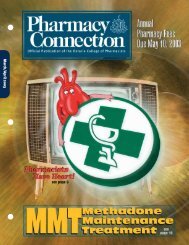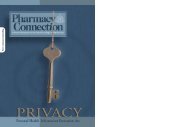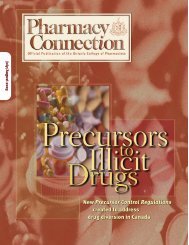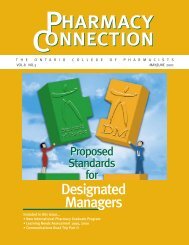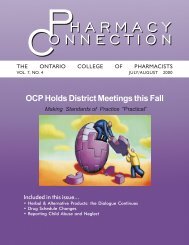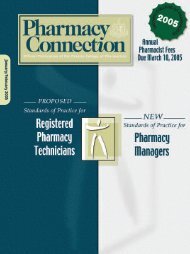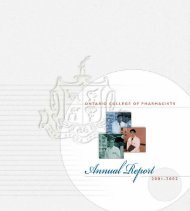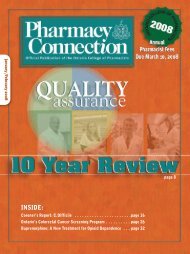pharmacy technician - Ontario College of Pharmacists
pharmacy technician - Ontario College of Pharmacists
pharmacy technician - Ontario College of Pharmacists
Create successful ePaper yourself
Turn your PDF publications into a flip-book with our unique Google optimized e-Paper software.
SOCIAL MEDIA<br />
on social-networking sites. While<br />
the focus was the responsibility to<br />
keep health information confidential,<br />
the issue <strong>of</strong> conduct outside<br />
the work place was also raised.<br />
REGULATING HEALTH<br />
PROFESSIONALS<br />
In <strong>Ontario</strong>, the authority <strong>of</strong> health<br />
regulatory colleges to govern<br />
the ethical behaviour <strong>of</strong> health<br />
pr<strong>of</strong>essionals is found within the<br />
Health Pr<strong>of</strong>essions Procedural Code.<br />
The Code, which is automatically<br />
deemed to be part <strong>of</strong> each health<br />
pr<strong>of</strong>ession Act, enables colleges<br />
to set and enforce standards <strong>of</strong><br />
pr<strong>of</strong>essional conduct and practice.<br />
Standards <strong>of</strong> practice, guidelines,<br />
codes, practice parameters and/<br />
or position statements provide<br />
informal assistance to members in<br />
the areas <strong>of</strong> practice, ethics and<br />
regulator expectations. Standards<br />
<strong>of</strong> practice guide and reflect<br />
generally accepted pr<strong>of</strong>essional<br />
behaviour; guidelines are suggested<br />
protocols; advisory statements<br />
alert members to new legislation<br />
and may make suggestions for<br />
compliance; and, position or policy<br />
statements identify how a regulator<br />
will address various situations.<br />
These documents, while not<br />
legally binding, are effectively used<br />
to address complex and rapidly<br />
changing issues.<br />
REGULATING PROFESSIONAL OFF-<br />
DUTY CONDUCT<br />
Both the on and <strong>of</strong>f-duty behaviour<br />
<strong>of</strong> a regulated pr<strong>of</strong>essional<br />
may be subject to investigation.<br />
Pr<strong>of</strong>essional misconduct applies<br />
to on-duty behaviour while<br />
‘conduct unbecoming’ generally<br />
refers to <strong>of</strong>f-duty behaviour. If it<br />
is accepted that <strong>of</strong>f-duty conduct<br />
can and should be regulated, then<br />
where does one draw the line?<br />
Where standards for <strong>of</strong>f-duty<br />
conduct are not well defined, a<br />
framework for analyzing misconduct<br />
must be defined instead. In<br />
a relevant case, the BC Supreme<br />
Court extrapolated an ‘ideal’<br />
framework that a hearing panel<br />
might use to make a decision on<br />
‘conduct unbecoming’ including<br />
establishing the principles that:<br />
• Some, but not all, <strong>of</strong>f-duty<br />
conduct can give rise to discipline<br />
for pr<strong>of</strong>essional misconduct or<br />
conduct unbecoming;<br />
• A panel should consider whether<br />
the conduct evidences direct<br />
impairment <strong>of</strong> the ability to<br />
function in the pr<strong>of</strong>essional<br />
capacity, or impairment in the<br />
wider sense as described in the<br />
case law (essentially that it would<br />
damage the integrity or standing<br />
<strong>of</strong> the pr<strong>of</strong>ession); and<br />
• In the absence <strong>of</strong> direct<br />
evidence <strong>of</strong> impairment, a<br />
Panel would need to consider<br />
whether it is appropriate<br />
to draw an inference<br />
<strong>of</strong> impairment in the<br />
circumstances.<br />
Accordingly, in order to<br />
apply this framework<br />
a panel would<br />
need to: a)<br />
identify the<br />
standard<br />
<strong>of</strong> pro<strong>of</strong><br />
to be<br />
used and<br />
determine<br />
whether there<br />
is enough evidence to<br />
prove misconduct; b) consider what<br />
the standard <strong>of</strong> conduct is (that <strong>of</strong> a<br />
reasonable member <strong>of</strong> the pr<strong>of</strong>ession)<br />
and whether the conduct falls<br />
below that standard; and c) if the<br />
conduct falls below the standard <strong>of</strong><br />
what is expected, decide whether<br />
the <strong>of</strong>f-duty conduct directly or<br />
indirectly impairs the pr<strong>of</strong>essional’s<br />
ability to do his or job and/or<br />
impairs the standing <strong>of</strong> the pr<strong>of</strong>ession<br />
in the community at large.<br />
In one reported case where a<br />
pr<strong>of</strong>essional’s <strong>of</strong>f-duty behaviour<br />
was determined by a regulatory<br />
body to be linked to his pr<strong>of</strong>essional<br />
duties, the case was<br />
successfully appealed on the basis<br />
<strong>of</strong> charter rights. Even though<br />
the pr<strong>of</strong>essional association<br />
had adopted a definition <strong>of</strong><br />
pr<strong>of</strong>essional misconduct, which<br />
specifically included <strong>of</strong>f-duty<br />
behaviour, a Court <strong>of</strong> Appeal<br />
quashed the decision on the basis<br />
<strong>of</strong> s.2(b) <strong>of</strong> the Canadian Charter<br />
which grants the right to freedom<br />
<strong>of</strong> thought, belief, opinion and<br />
expression, including freedom<br />
<strong>of</strong> the press and other media <strong>of</strong><br />
communication.<br />
DISCUSSION<br />
Health pr<strong>of</strong>essionals have<br />
a well-established tradition<br />
<strong>of</strong> upholding standards <strong>of</strong><br />
pr<strong>of</strong>essional conduct<br />
and it is common for<br />
regulatory bodies to<br />
publish guidelines,<br />
standards <strong>of</strong> practice,<br />
policies and procedures<br />
to signal the<br />
behaviour<br />
expected<br />
from a<br />
member<br />
<strong>of</strong> the<br />
pr<strong>of</strong>ession.<br />
These<br />
tools provide<br />
guidance about<br />
how to behave in the<br />
context <strong>of</strong> complex and changing<br />
circumstances and are also utilized<br />
to stimulate discussion within a<br />
pr<strong>of</strong>ession about the role <strong>of</strong> the<br />
pr<strong>of</strong>essional within society.<br />
Pr<strong>of</strong>essionals are clear about<br />
meeting standards <strong>of</strong> conduct while<br />
practicing their pr<strong>of</strong>ession, but what<br />
about <strong>of</strong>f-duty conduct? Rules<br />
governing ethical behaviour have,<br />
for the most part, lagged behind<br />
PAGE 24 ~ SPRING 2011 ~ PHARMACY CONNECTION


